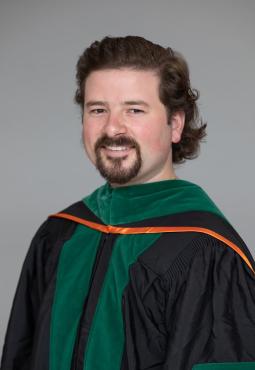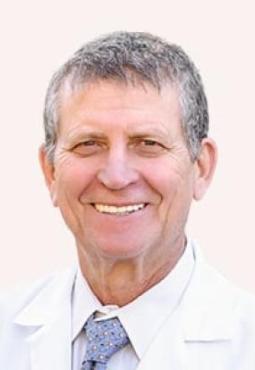Sebastian Sanchez-Luege was treated for a rare and aggressive lymphoma as a child at City of Hope. This spring, he graduated from medical school
They cheered long and loud for Sebastian Sanchez-Luege as he ascended the podium on May 11, 2022, to address his fellow medical school graduates at the University of Miami.
Looking out at the 192 newly minted doctors, Sanchez-Luege (everybody calls him “Sebi”) urged his colleagues to be vulnerable, to be open to their patients’ stories, to take the extra moment to listen, to care, to calm fears.
But first, Sanchez-Luege reached back into his childhood and talked about … his hair.

“At a Carl’s Jr. drive-thru one day, I brushed my hands through my hair and bunches of it fell off, all over the back seat of the car,” he recalled. “I was 6 when I first heard the word ‘cancer,’ and soon after learned about chemotherapy, radiation and remission.”
It was right around Thanksgiving of 2001 when young Sebi began to feel ill. His parents thought it was the flu. But a visit to the pediatrician set off alarms and sent the family to the emergency room, where they got the news: Stage 4 non-Hodgkin anaplastic large cell lymphoma, a rare and aggressive blood cancer.
“It sets your world on a spin,” recalled Carmen Luege, his mother. “It had a huge impact. In an instant, I was the panicked mother of a very ill child whose survival was in question.”
Running Out of Time?
Sanchez-Luege began chemotherapy and radiation treatment near the family home in Tustin, California. Twice he went into remission. Twice he relapsed. Worried they were running out of time, his mother called City of Hope to ask about a bone marrow transplant. The oncologist on call immediately replied, “Bring him over.”
And this is where the story pivots, because City of Hope is where Sebi’s life was not only saved, but given direction.
They drove to Duarte, Sebi seriously ill, suffering from chills. The same oncologist waited past the end of her shift to receive Sebi and stabilize him. She would continue to visit him every day over the following weeks, even after his case had been handed off to others, just to see how he was doing. Those were the first of many acts of kindness, support and continuity of care, all of which left an impression.
“I knew this was the right place for Sebi to take the next step,” Luege said. “Everybody was so caring. I think that’s why he had such good outcomes.”
Sebi would spend months at City of Hope going through the transplant process. His memories are typical of a first-grader who knows he’s ill but doesn’t really understand much else. He recalls doing puzzles, hanging out with his cousins, sneaking down to a tunnel beneath the building for a makeshift baseball game, racing a remote toy car in the parking lot while the parking attendant smiled and looked away.
And he remembers how everyone would greet him with a hearty, “Hi, Sebi!” every day. “Folks were so excited to see me whenever I came in,” he recalled. “I didn’t feel like a burden.”
A Memorable Patient
They remember him, too.
“He was an amazing kid, never complained,” recalled Claudia Herrera of the Childhood Cancer Survivorship Program.
“And he always had a big smile for us,” echoed longtime pediatric specialist Karla Wilson, R.N.
Mom remembers how, at every turn, there was always someone providing support.
“The children’s coordinator came in every day,” she explained. “She ran group activities, but Sebi couldn’t always get there so she’d come to us and play games with him so I could take a break and tend to my other kids.” (Sanchez-Luege has an older brother Nicelio and a younger sister Sofia.) “I also met with a psychologist there who helped me deal with my own anxieties and even gave me meditation tapes.”
There was good reason to be anxious. Finding a donor had been difficult; no one in the family matched. Help came from Europe — a cord blood donor from Spain.
Doctors warned that the transplant was a long shot. “The odds were not good,” said his mother. “We didn’t know if he’d live or die.”
He beat the odds.

A team led by pediatric oncologist Joseph Rosenthal, M.D., M.H.C.M., performed the transplant on then-7-year-old Sebi in October 2002. He has been cancer free ever since.
Sanchez-Luege knows his experience at City of Hope set him on his current path. It started almost right away. While still in grade school, he’d tell his doctors during follow-up visits that one day he’d sit across the table from them as a colleague. In high school he raised money for The Leukemia & Lymphoma Society and Cure Search. He created a video game app and donated the proceeds to City of Hope. (“It was the least I could do,” he said.) During college he attended City of Hope’s Eugene and Ruth Roberts Summer Student Academy, studying T cells.
And for many years, Sanchez-Luege and his mother never missed the annual City of Hope Bone Marrow Transplant Reunion.
A Different Specialty
He points to the “fully invested” people who cared for him at City of Hope — some of whom, like Herrera and Wilson, he still sees regularly — when he talks about the kind of empathetic doctor he wants to be. He’s now headed to Stanford University for a fellowship in anesthesiology.
And yes, he knows what you’re thinking.
The stereotypical anesthesiologist typically doesn’t conjure up an image of empathy. It’s more like a few moments of contact before surgery and then poof! End of relationship.
Precisely, says Sanchez-Luege. He’s seen that himself many times, he knows how much patients dislike it, and he means to change it. He aims to use those precious moments “to establish a rapport with patients, to calm them down, put them in a better frame of mind. Some doctors get years with a patient [to establish such a rapport]. I want to see if I can do it in minutes. I like the challenge.”
“The patients we will encounter have stories to share. They come to us with more than an illness. It is up to us to uncover their fears and aspirations, and to understand the social network in which they exist,” he told his medical school graduating class.
Those who know him best can’t wait to see Sanchez-Luege get out there and begin practicing medicine.
“I’m very excited,” said his mother. “He has such kindness. I think he’ll bring compassion and empathy [to his work]. His experiences will set him apart.
“My wish is that Sebi's story will bring hope to all the patients and their families who are now in their journey towards remission, and that it inspires City of Hope doctors, nurses and staff to continue to walk the path with kindness, empathy and joy.”
The Department of Supportive Care Medicine at City of Hope was the first in the United States to fully integrate across supportive care specialties and into the patient’s clinical care and is one of the largest programs of its kind today. The program provides cancer patients with comprehensive physical, psychological, social and practical support services, including care navigation; survivorship programs; specialists in cancer and aging; Child Life specialists; psychological and spiritual counseling; pain management; integrative medicine such as yoga, massage and meditation; and more — all with a focus on maximizing patient and family strengths, quality of life and the ability to best engage in their treatment journey and beyond. Thanks to a gift from the Sheri and Les Biller Family Foundation, City of Hope is working to expand this offering across its cancer care system and to advocate for establishing supportive care as a standard best practice for cancer care in the United States.